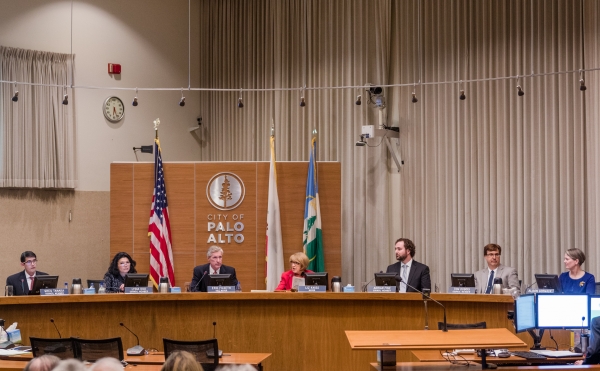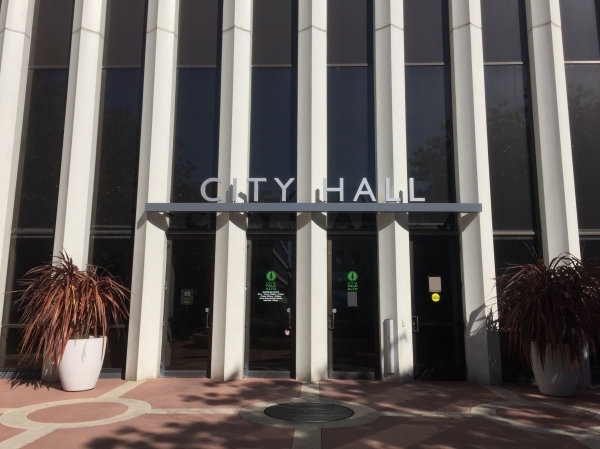Despite their role as stewards of public money, members of the Palo Alto City Council are prone to swiftly approving, without a peep of debate, big-ticket contracts that sometimes exceed $10 million.
For Councilman Greg Tanaka, the council's most vocal fiscal hawk, that's a problem. On Saturday, Tanaka took issue with the long-standing practice of approving large contracts on the consent calendar, a list of items that get approved with a single vote and without discussion. And after some debate, he and his colleagues agreed to explore a possible solution: setting a money limit on items that can go on consent.
"It's kind of weird to have a $10 million contract just on consent," Tanaka said during the council's Saturday's retreat, where members were considering changes to their rules and procedures and setting their priorities for the year.
"To me, it's about building trust with the public, letting the taxpayers know that the money is being spent wisely," Tanaka said.
Others don't see the practice of approving large contracts on consent as particularly problematic, given that the city runs its own utilities and that some items that show up on the agenda pertain to expensive but regular tasks like power-purchase agreements or maintenance of gas pipelines. Those who oppose changing the rules argued that council meetings already tend to go late, with the council consistently postponing important items because of the late hour.
As such, requiring full discussions for routine expenditures would almost certainly make meetings longer without necessarily making them more productive, critics said.
Mayor Adrian Fine noted that there isn't always a direct correlation between dollar amounts and the need for discussion. On some days, the council approves $12 million- or $15 million contracts on consent and no one seems to care. On others, the council may be discussing an issue that doesn't include any expenditures, but it's contentious important enough to warrant full discussion as an "action" item.
Under the council's existing rules, it's up to the mayor and the city manager to set the agenda and decide what amounts to an action item and what should go on consent. Both Fine and Councilman Eric Filseth, last year's mayor, agreed that the system works just fine.
Setting a monetary limit can create its own problems, Filseth said. Making it too low could lead to a huge increase in action items, defeating the purpose of a consent calendar. Making it too high could result in no items hitting the threshold, making the policy pointless. A new policy establishing a monetary threshold for discussions is a "solution looking for a problem," he said.
Their colleagues didn't feel particularly strongly about the issue, but agreed it's at least worth exploring. Vice Mayor Tom DuBois said he isn't sure what the threshold would be, but argued that there probably is "some dollar levels where it serves the council (well) to have oversight."
That threshold, he noted, might be different for utilities than it would be for the general fund, which pays for most basic city services.
DuBois initially recommended having the council's Policy and Services Committee debate the topic and issue a recommendation on what thresholds, if any, should be adopted for consent items. When his motion failed, the council colleagues voted 4-3, with Fine, Filseth and Councilwoman Alison Cormack dissenting, to assign give the assignment to its Finance Committee.
The council considered several other changes, though in those cases most favored maintaining the status quo. One idea was changing the threshold for "pulling items off consent," a move that turns a consent calendar item into an action item.
Currently, it takes three council members to pull an item off consent. Tanaka and DuBois suggested changing the threshold to two council members. DuBois said he recognizes that there is a fear that if the council makes it easier to pull items off the consent calendar, "we will pull things off willy-nilly." He posited, however, that council members will quickly learn that this is not productive.
"It puts (the) responsibility on council members to really consider whether to pull things off and what it means for our agendas, but I think we should trust each other," DuBois said.
Others suggested that changing the rule would make it too easy to pull items. Fine said any council member would be able to simply ask one colleague for the courtesy of joining them. Keeping the threshold at three requires council members to do a little more work at convincing their colleagues that the item should be pulled.
Concerned about efficiency, the council voted 4-3 to retain the three-member threshold for pulling consent calendar items, with DuBois, Tanaka and Councilwoman Lydia Kou dissenting.
Councilwoman Liz Kniss proposed another idea that she said would speed up meetings: starting every discussion with a motion rather than going through a round of questions, as is the norm today. Only Tanaka supported her proposal, which failed by a 2-5 vote.
"We deal with a range of complexity of issues," Filseth said. "Some are cut-and-dry and some take a lot of questioning and analysis. ... I think it's too broad to do a one-size-fits-all on this."




Comments
Downtown North
on Feb 4, 2020 at 1:09 pm
on Feb 4, 2020 at 1:09 pm
Leave it to Liz Kniss and Greg Tanaka wanting to cut off public input and discussion. Trumpish. Oh hey, wasn’t Tanaka a Republican?
Another Palo Alto neighborhood
on Feb 4, 2020 at 1:22 pm
on Feb 4, 2020 at 1:22 pm
It isn't always the amount so much as it is the newness. If the city is renewing a contract where there is no reasonable expectation of change, then, debate can be a waste of time. But, $1M of new spending here, $1M of new spending there, and pretty soon, you are talking about real money.
Downtown North
on Feb 4, 2020 at 3:34 pm
on Feb 4, 2020 at 3:34 pm
I would be interested in seeing who these contracts go to. The whole fiasco around the bike boulevard and Ross road, with strange street changes that were wholly unsafe, you have to wonder who approved these contracts with which bidder?
When the work done is incompetent and extremely expensive, you have to wonder how they landed on that specific bid and contract.
Crescent Park
on Feb 4, 2020 at 4:12 pm
on Feb 4, 2020 at 4:12 pm
Simple explanation...it's always easier (and often more fun) to waste/spend money that either isn't your own OR you didn't have to work for.
Adobe-Meadow
on Feb 4, 2020 at 10:23 pm
on Feb 4, 2020 at 10:23 pm
Time to carve out a place on the city blog that states what contracts have been issued, for how much, and for what purpose. We have city employees that are employed to do specific jobs. The city departments should be the first place to look to get things done. If the job is out of the normal city jobs then what is it for?
If we are in the business of granting contracts to friends, family members, old college mates, etc. then we have a major problem - which I associate with government employees. Sometimes it is better to hire an outside company since we are then not on the hook for their medical plans, retirement plans, etc. There has to be a logical trade-off.
Adobe-Meadow
on Feb 5, 2020 at 9:58 pm
on Feb 5, 2020 at 9:58 pm
If the parking lot for the new Children's Museum is any indicator, the City cannot be trusted to hire a contractor who can correctly make something simple like a parking lot (an asphalt slab with white stripes painted on it).
Still waiting for the dangerous to drivers, pedestrians, and cyclists road furniture to be removed from Ross and Charleston.
Palo Alto Online: using ">" doesn't make text HTML.
Another Palo Alto neighborhood
on Feb 6, 2020 at 9:48 am
on Feb 6, 2020 at 9:48 am
Posted by Rick, a resident of Adobe-Meadow
>> If the parking lot for the new Children's Museum is any indicator, the City cannot be trusted to hire a contractor who can correctly make something simple like a parking lot (an asphalt slab with white stripes painted on it).
LOL. Seriously, California needs to fix its broken-statewide contract bidding process. Like, really, seriously. Look what happened here:
2012 prediction: Web Link
2018 followup: Web Link
>> Still waiting for the dangerous to drivers, pedestrians, and cyclists road furniture to be removed from Ross and Charleston.
Repeating this over and over doesn't make it true. To be clear, I have doubts about bicycles+mini-roundabouts, but, most of these "road furniture" configurations have been around since the 1970's and are generally accepted as safe. I've seen a lot of near-accidents recently, but, they have all been from a specific new technology-- electric scooters, which are being ridden in a way that is extraordinarily dangerous-- to my cardiac health anyway. These high-speed scooters are ripping along on sidewalks, and then shoot out into crosswalks, across streets, in and around cars, bicycles, and pedestrians with great abandon. This causes cars and bicycles to slam on their brakes, and pedestrians to freeze, hoping they won't get hit. Wins the prize for rudest new invention.